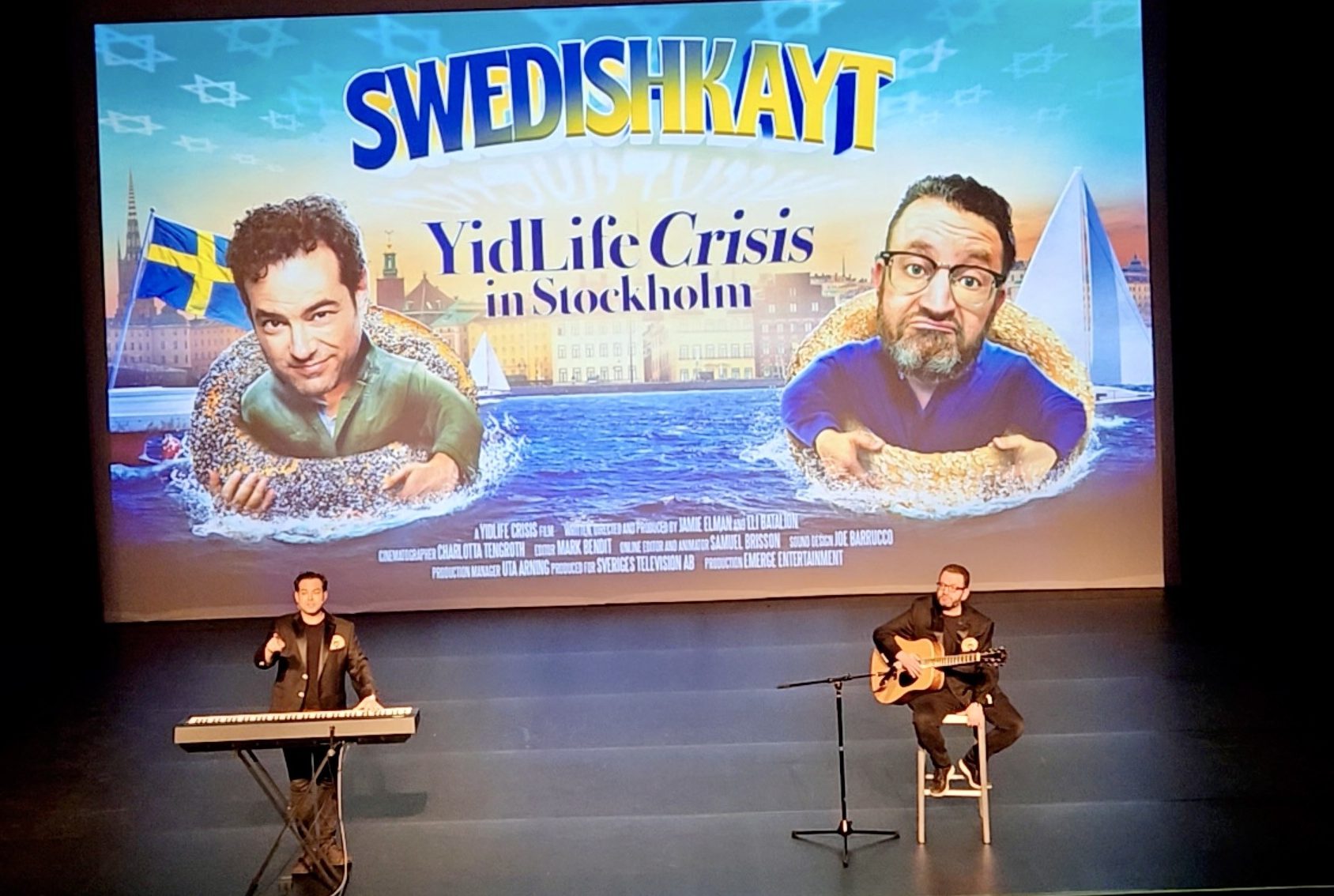Entertainment
YidLife Crisis Explores Swedish-Yiddish Ties in New Film

The comedy duo YidLife Crisis, comprising Eli Batalion and Jamie Elman, has released their second feature-length film, titled Swedishkayt: YidLife Crisis in Stockholm. This film sheds light on Sweden’s lesser-known Jewish history, intertwining Yiddish language and culture in a narrative that reveals unexpected connections. The film premieres in Stockholm on November 20, 2025, as part of celebrations marking the 250th anniversary of the Jewish community’s presence in Sweden.
Batalion and Elman, who have been bringing Yiddish culture to wider audiences since their web series debut in 2015, use their platform to explore Yiddish and its manifestations around the world. Their work is characterized by a blend of Yiddish, English, and Québécois French, often accompanied by subtitles in English, French, and even Mandarin Chinese. During a recent keynote address at the Jewish Futures arts salon, Elman humorously noted, “Believe you me, we are totally amazed that people consider us to be authorities in Yiddish and believe you me, we absolutely are not.”
Exploring Cultural Connections
The duo’s journey into Swedish-Jewish connections began in 2015 at a Jewish conference in Birmingham, England. They were introduced to a professor of Yiddish from Lund University, who informed them that he utilized their material as a teaching tool. This unexpected encounter piqued their interest, leading them to further investigate Yiddish culture in Sweden.
Their research brought them to Tomas Woodski, a Yiddishist and talk show host at Swedish public broadcaster SVT. Woodski’s show features YidLife Crisis, illustrating the cultural exchanges that have developed since their initial visits to Sweden. The film, made in 2024, includes appearances by Woodski and explores the vibrant Yiddish community in cities like Stockholm, Malmö, and Gothenburg. Following Sweden’s ratification of the European Charter for Regional or Minority Languages in 2000, Yiddish has been recognized as a protected minority language, alongside Romani and Sami languages.
Batalion explained the shift in their creative process for this film, noting, “We knew in advance that the primary audience would be the non-Jewish Swedish world who are going to see it on their public broadcaster.” This required a different approach than their previous projects, which were often tailored for Jewish film festivals or North American audiences familiar with Jewish culture.
Celebrating Jewish Life and Culture
The film aims to celebrate the long-standing Jewish community in Sweden, which has existed for as long as Jewish communities in Canada. Elman highlighted the significance of this history, stating, “This year, 2025, Sweden is celebrating its 250th ‘Jew-bilee’ year of Jewish life in Sweden, which is partly tied into this project.”
In addition to the film’s national release, the duo is also touring with a director’s cut that expands on the themes and nuances for audiences familiar with Jewish culture. This version adds approximately 18 minutes to the original, allowing Batalion and Elman to delve deeper into topics like antisemitism and Yiddish identity. “We still explain things in the movie that are for Jewish audiences,” Elman said, “but in the director’s cut, we lean into more of the Jewish themes and concepts.”
The duo continues to engage audiences through live presentations, combining their documentary screenings with performances that include music and a light-hearted roast of local Jewish communities. “We can’t help ourselves… we lovingly roast and toast the local Jewish community,” Elman noted.
As they navigate the complexities of Jewish identity amidst rising antisemitism, Batalion and Elman emphasize the importance of community and cultural exchange. “There becomes a very strong through-line between the Montreal Jewish community, the Canadian Jewish community, and the Swedish community,” Batalion explained, highlighting the universal themes of love, food, and music that resonate across cultures.
The film and its accompanying live performances enrich the understanding of Yiddish culture and its unexpected connections, making it an engaging exploration for audiences in both Sweden and the wider Jewish Diaspora.
-

 Politics2 weeks ago
Politics2 weeks agoSecwepemc First Nation Seeks Aboriginal Title Over Kamloops Area
-

 World4 months ago
World4 months agoScientists Unearth Ancient Antarctic Ice to Unlock Climate Secrets
-

 Entertainment4 months ago
Entertainment4 months agoTrump and McCormick to Announce $70 Billion Energy Investments
-

 Lifestyle4 months ago
Lifestyle4 months agoTransLink Launches Food Truck Program to Boost Revenue in Vancouver
-

 Science4 months ago
Science4 months agoFour Astronauts Return to Earth After International Space Station Mission
-

 Technology3 months ago
Technology3 months agoApple Notes Enhances Functionality with Markdown Support in macOS 26
-

 Top Stories1 month ago
Top Stories1 month agoUrgent Update: Fatal Crash on Highway 99 Claims Life of Pitt Meadows Man
-

 Sports4 months ago
Sports4 months agoSearch Underway for Missing Hunter Amid Hokkaido Bear Emergency
-

 Politics3 months ago
Politics3 months agoUkrainian Tennis Star Elina Svitolina Faces Death Threats Online
-

 Politics4 months ago
Politics4 months agoCarney Engages First Nations Leaders at Development Law Summit
-

 Technology4 months ago
Technology4 months agoFrosthaven Launches Early Access on July 31, 2025
-

 Lifestyle2 months ago
Lifestyle2 months agoManitoba’s Burger Champion Shines Again Amid Dining Innovations



















